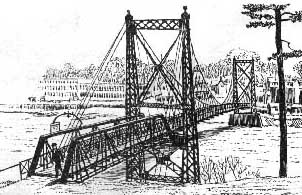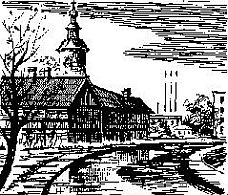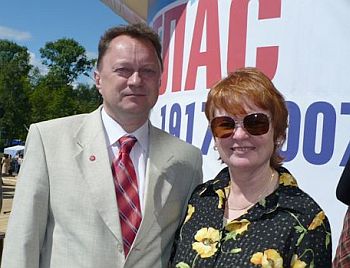 |
Kotlas - Waterville Area Sister City Connection P.O. Box 1747 Waterville, ME 04903-1747 Write to Us |
 |
|
Home > Impressions > Summer 2007 > Report from Russia Report from RussiaBy Craig Lyons, Correspondent
WATERVILLE — Thousands of miles from home, Ellen Corey found herself in the midst of a huge anniversary celebration. The working-class city of Kotlas, Russia, was celebrating its founding 90 years earlier. All of the residents turned out for the big day, June 11, and Corey was stunned at the fervor surrounding the event. "What was really interesting was one of the celebrations on the big day was a parade. All of the economic sectors participated in the parade," said Corey. "I know sometimes in Waterville we have trouble putting parades together." Corey, co-chairwoman of the Kotlas-Waterville Area Sister City Connection, went to Kotlas June 8-15 for the city's birthday as a representative of its sister city, Waterville. Kotlas was selected as a sister city for its similarity to Waterville — and Corey said life there isn't too different. Though Kotlas is much bigger, both cities are northern and at one time economically dependent on manufacturing and lumber. But, like Waterville, Kotlas has lost a great deal of its manufacturing. The city is still struggling to rebuild its economy as it recovers from the economic upheaval following the breakup of the old Soviet Union. Corey, who was making her third trip to Kotlas, said things seem to be improving. "Each time I've been there, I've seen great improvements in the goods available and the standard of living," said Corey. While killing time in Kotlas one day, Corey found herself in a shop that was selling $100 bottles of perfume. "They wouldn't be opening these stores if people couldn't buy," said Corey. "So things are looking up for a large sector of the economy." Another sign of change in Kotlas was shown through the opening of a dry cleaner. All of the dry cleaners closed because people couldn't afford to use them, according to Corey. In sharp contrast was the experience of Phil Gonyar, former chairman of the Kotlas-Waterville Area Sister City Connection committee, in 1991 when store shelves in Kotlas were empty. While around town with his pen pal, Gonyar asked what was in the grocery store to buy and his friend replied, "Apple juice." Gonyar saw Kotlas in the wake of the breakup of the Soviet Union when times were very hard. "People lost all of the economic benefits of the Soviet system. As a result of the turmoil everybody lost their savings," said Gonyar. "So that the money they had saved was wiped out in the turmoil." Not only were savings gone, but also government pensions, jobs, education and other benefits provided by the Soviet government. "It was trying to find their feet in a place that had totally turned upside down on them," said Corey. But as things are looking up for Kotlas, Mayor Sergei Melentyev expressed his hopes for the future to Corey, she said. Among the things Melentyev said he wants to see are an increase in population, the construction of a sports stadium and better roads, Corey said. "Compared to Russian roads, the Colby end of North Street isn't so bad," said Corey. Although, Waterville and Kotlas share similarities, Corey said there are still differences other than the impact of the collapse of the Soviet Union on Kotlas. Among them: The number of people who walk around town in Kotlas and the availability of public transportation, according to Corey. Automobiles are another sign of growing prosperity for the people of Kotlas, according to Corey. "There's an explosion in the number of automobiles in Kotlas. For a city that was built in a time when there were virtually no cars," she said. Corey found herself noticing little things: how Russian children love to perform in public, how old the churches are, their steps grooved and worn from generations of feet. The Kotlas-Waterville connection was forged in the fires of the Cold War, to bridge the gap between two economic and political systems and their peoples. The cities periodically swap delegations. Last September Waterville hosted a delegation of Russian doctors, who got a first-hand view of the U.S. health-care system by visiting area hospitals and shared stories about what it's like practicing medicine in Kotlas. Aside from the trips, the group also organizes a Russian Sampler at Colby College for junior high school students, a program that inspired an American sampler in Kotlas to teach about American life. With the collapse of the Soviet Union there has been a drop in interest in that region of the world, say members of the sister city group, though they are looking to boost interest. "It's in our best interest to learn about them," said Corey. From the Morning Sentinel, 7/2/2007, p. B1. Used by permission. |
